Astranis announced on March 18 that it has sold a small geostationary broadband satellite, which is scheduled to be launched in 2025, to Orbith, a remote connectivity provider located in Argentina.
The manufacturer from California has now revealed the customers for all five satellites in Block 3, their third group of spacecraft set to be launched simultaneously on an undisclosed rocket.
Orbith currently rents capacity from satellite operators to connect customers throughout Latin America. However, the company asserts that limited availability and high prices have hindered its growth in countries like Argentina.
Astranis' satellites, which are about the size of washing machines and weigh around 400 kilograms, are designed for smaller, regional coverage. They are less expensive than typical geostationary spacecraft, which weigh thousands of kilograms, although they have a shorter design life of eight years.
Astranis operates the satellites it constructs on behalf of customers and provides the capacity through long-term leases.
Orbith CEO Pablo Mosiul stated, 'Having a satellite tailored specifically to our needs and to the demand from our customers in the country gives us a significant competitive advantage that will help us expand our coverage across the country.'
Joining Orbith in Block 3 is a recently announced satellite for Thai fleet operator Thaicom, one for capacity reseller Orbits Corp of the Philippines, and two for Mexican telco Apco Networks.
This year, Astranis plans to launch a batch of four Block 2 satellites on a dedicated SpaceX Falcon 9 rocket.
Originally scheduled to launch last year, Block 2 was delayed due to an issue with the solar array component of the inaugural Astranis satellite, named Arcturus, after it was sent to orbit in April on a SpaceX Falcon Heavy. Block 2 includes another satellite for Orbits Corp, two for mobile satellite connectivity specialist Anuvu, and a multi-mission spacecraft called UtilitySat that would provide interim services for Alaskan telco Pacific Dataport, which ordered Arcturus for services over Alaska. In February, Astranis
transported Arcturus on a two-month journey
to an orbital slot over Asia to enable Israeli satellite operator Spacecom to meet a regulatory deadline for bringing the position into use. Astranis announced on March 18 that it has sold a small geostationary broadband satellite, which is scheduled to be launched in 2025, to Orbith, a remote connectivity provider located in Argentina. to an orbital slot over Asia to enable Israeli satellite operator Spacecom to meet a regulatory deadline for bringing the position into use.









